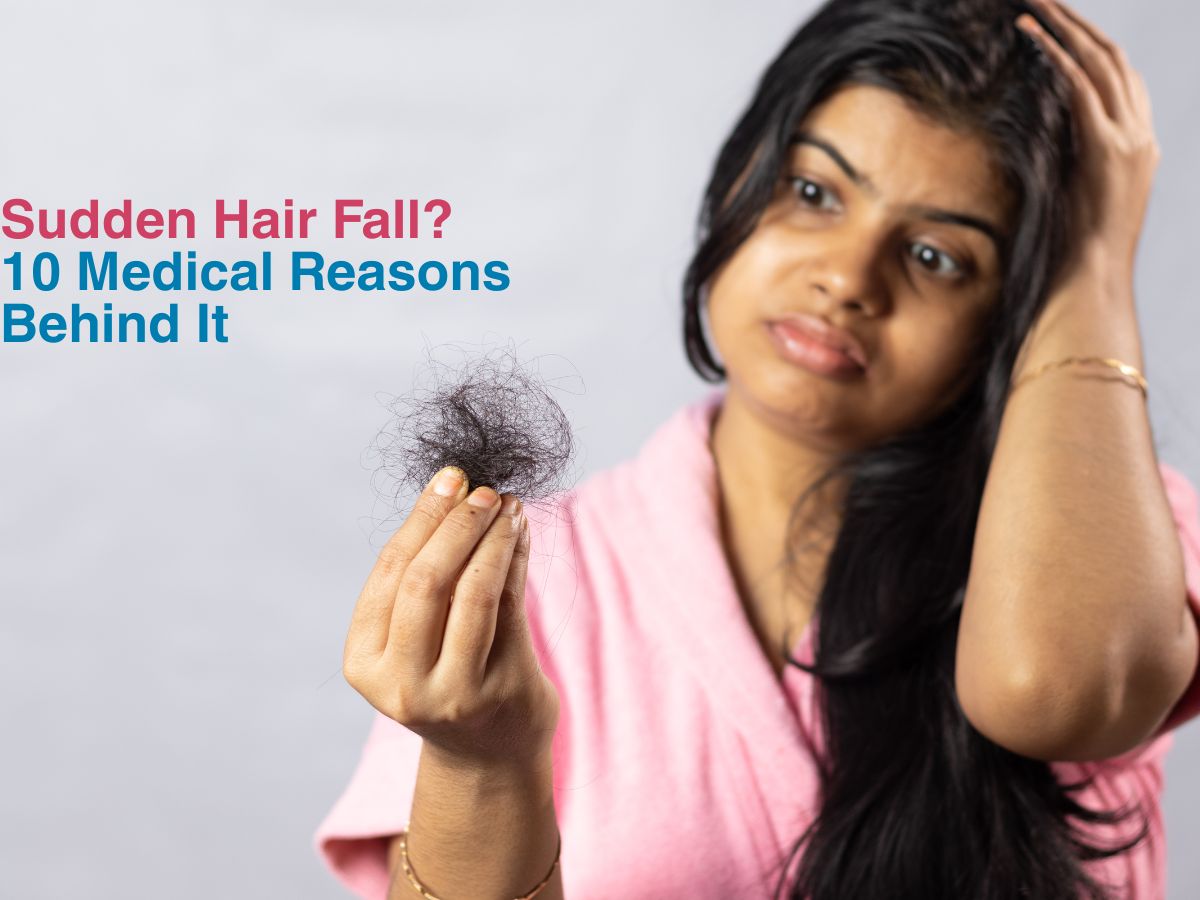
Sudden Hair Fall? 10 Medical Reasons Behind It

Medical Conditions That Lead To Rapid Hair Loss-
Hair is not just about beauty. It is memory stitched into protein. When it begins to fall faster than usual, it is often the body sending you a subtle SOS. When your body undergoes certain medical shifts, that gentle rhythm turns into a stampede.
- Telogen effluvium is one such culprit. A tongue-twister name for something simple: your hair follicles prematurely enter the resting phase. After surgery, an illness, or even crash dieting, you may find yourself shedding like a tree after a storm.
- Fungal infections on the scalp, like Tinea capitis, quietly attack hair roots from beneath. They do not always come with itching or redness. Sometimes, they only bring hair out on your comb.
- Anaemia, a quiet thief of oxygen, robs your follicles of the air they need to breathe and build. With less oxygen, hair becomes lifeless.
Hormonal Imbalance And Hair Fall Connection-
Hormones are nature’s secret messengers. When they whisper the right notes, you glow. But when they shout over each other, your body becomes a battleground. Let us look at 4 different instances below-
- Take thyroid disorders for example. If your thyroid is working overtime (hyperthyroidism) or under-performing (hypothyroidism), hair fall often follows. The strands thin out, not just on your scalp but sometimes from your eyebrows too. You may not feel ill. But your hair knows something is wrong.
- Then there’s PCOS, a complex condition that affects 1 in 5 Indian women. It doesn’t just disturb periods. It floods the body with androgens – male-pattern hormones that shrink hair follicles and promote facial hair growth in return. A cruel trade-off that is dictated by imbalance.
- Postpartum hair fall is another sordid chapter. After childbirth, oestrogen levels drop suddenly, like the closing curtain after a grand performance. What seemed like luxurious pregnancy hair now comes off in handfuls.
- Hormonal hair loss is sneaky. It doesn’t always arrive with pain or rashes. But when your body’s messengers lose their rhythm, your hair becomes their first casualty.
Stress-Related Hair Fall Symptoms And Recovery-
Telogen effluvium, often triggered by emotional distress, financial strain, exams, or heartbreak, shifts a large number of follicles into sleep mode. You won’t feel it immediately. The shedding begins 2–3 months later, leaving you confused.
Imagine the body as a power grid. In times of stress, it diverts energy from non-essentials. Hair, being non-vital, is the first to lose funding. In India, stress is often internalised. We function. We smile. We endure. But hair doesn’t lie. It shows us the impact of what we’ve buried.
The solution? Not magic oils or miracle serums. You need repair, not just a product. That could mean therapy. Sleep. Deep breathing. Eating meals on time. Reclaiming softness in a hard season. Stress-induced hair loss is usually reversible. But the healing isn’t instant. It’s quiet. Like rain soaking into dry land, it takes time before green shoots return.
Autoimmune Diseases That Cause Hair Fall-
Sometimes, the very system designed to protect you becomes confused and turns against you. Yes, we are talking about your immune system.
Autoimmune diseases occur when your immune system mistakes your own cells for invaders. In conditions like Alopecia Areata, it attacks hair follicles, causing small, coin-sized bald spots. These patches may appear overnight, without warning. Other autoimmune illnesses, such as lupus, can affect the skin, scalp, or blood vessels, quietly sabotaging hair growth from within. Even the medications used to treat these conditions, like corticosteroids, may contribute to thinning hair- which can seem really ironic at times.
India’s climate of stigma often keeps such conditions hidden. But there’s hope. With correct diagnosis and care, many people with autoimmune hair fall do experience regrowth. It takes coordination between dermatologists, rheumatologists and also highly depends on just your own patience.
Conclusion
Each strand that falls is a thread of a larger story. It may speak of illness, imbalance, fatigue, grief, or even inherited battles within your DNA. In many Indian homes, the first response is often oil. But not every leak is fixed with surface solutions. We must look deeper. That means asking about your thyroid, your iron levels, your stress and your gut health. It means acknowledging that your hair isn’t separate from your body. It is one of its most honest messengers. So the next time your fingers pull away more than they should, don’t panic. Pause. Listen. Investigate. Because true recovery begins beneath the scalp and not on it.






